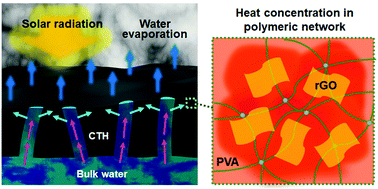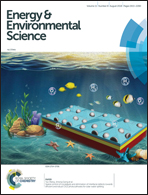A hydrogel-based antifouling solar evaporator for highly efficient water desalination†
Abstract
Solar desalination is a promising method for large-scale water purification by utilizing sustainable energy. However, current high-rate solar evaporation often relies on optical concentration due to the diffusion of natural sunlight, which leads to inadequate energy supply. Here we demonstrate a hydrogel-based solar evaporator that is capable of generating vapor at a high rate of ∼2.5 kg m−2 h−1 under one sun irradiation (1 kW m−2), among the best values reported in the literature. Such highly efficient solar evaporation is achieved by a hybrid hydrogel composed of a hydrophilic polymer framework (polyvinyl alcohol, PVA) and solar absorber (reduced graphene oxide, rGO), which has internal capillary channels. The PVA can greatly facilitate the water evaporation owing to the reduced water evaporation enthalpy in the hydrogel network. The rGO penetrating into the polymeric network enables efficient energy utilization. The capillary channels sustain an adequate water supply for continuous solar vapor generation at a high rate. This hydrogel-based solar evaporator also exhibits promising antifouling properties, enabling long-term water desalination without recycling. The high-efficiency hydrogel-based solar vapor generators open significant opportunities to enhance solar water evaporation performance and reduce the cost of solar desalination systems.



 Please wait while we load your content...
Please wait while we load your content...